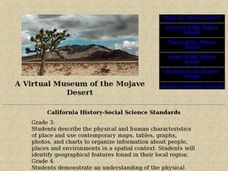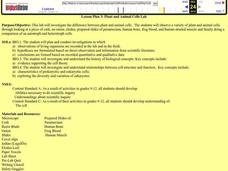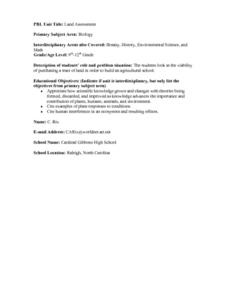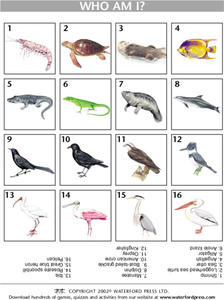Curated OER
Rosa Parks Community Garden
Students explore gardening and nutrition in the Rosa Parks Community Garden. They work in stations to discuss food choices, the life cycles of plants, and mini-composting. After starting in one station, they rotate to try each activity.
Curated OER
The Busy Pond
In this pond ecosystem mini book worksheets, students cut out, color, and study the pond plants, animals, and ecosystem by creating a mini book.
Curated OER
Water Regulation
Students use their basic knowledge of physiology to analyze graphical data of paramecia under diverse conditions. From the data analysis, Students develop explanations of the animal's response to the concentration of different solutions...
Curated OER
Habitat
Fourth graders study the components of a habitat. In this animal habitat lesson, 4th graders define the elements of a habitat. Students discuss intertidal habitats and make a habitat for a crab.
Curated OER
Managing Nutrients in Livestock Manure
Livestock managers reinforce math and science skills while learning about the nutrients found in manure. They predict which animal produces the largest amount and which animal's manure contains the most nitrogen. Finally, they compare...
Curated OER
How Are We Alike and Different?
Students review an online database and look for similarities and differences among the plants, animals, and non-living things that were listed. They compose a narrative based on their conclusions.
Curated OER
Field Trip to your Square
Students visit an outdoors area and mark out a square on the ground that they examine. They look for and record the plants, animals, and non-living things they find in the square and post their findings on the Internet for other classes...
Curated OER
A Virtual Museum of the Mojave Desert
Learners study deserts and the plants, animals, and people who inhabit them. In groups, they create their own stories about the inhabitants of the Mojave desert.
Curated OER
Desert Views - First Impressions: Travelers on the Gila Trail
Students draw animals and plants that are described to them as they read passages of people who traveled across the Gila Trail in the Southwest. In this Gila Trail lesson plan, students also write a letter describing a plant or animal in...
Curated OER
Plant and Animal Cells
Students investigate the difference between plant and animal cells. They observe a variety o plant and animals cells by looking at a piece of cork, an onion, elodea, prepared slides of paramecium, human bone, frog blood, and human...
Curated OER
Plant and Animal Cells - Are they Different?
High schoolers observe the similarities and differences between plant and animal cells. In this cell activity, students use microscopes to observe self prepared slides of animal and plant cells.
Curated OER
Soil Composition
Students examine soil. In this soil composition lesson students participate in soil sedimentation and filtration activities. The students discuss what non-living and living things are in soil and why it is so important.
Curated OER
Observing Plants Through a Journal
First graders observe a plant, write about it, and illustrate their writing in a journal.
Global Oneness Project
The Consciousness of Nature
Scholars voice their opinions about animal consciousness with an article that challenges common ideas about nature. After reading the article, learners engage in a thoughtful discussion before writing out their arguments in a persuasive...
Agriculture in the Classroom
A Rafter of Turkeys
How did that turkey get from the early Aztec culture to your table? Learn about the history of wild and domesticated turkeys in North America, as well as their inclusion in Thanksgiving traditions, with a two-part agricultural science...
Curated OER
Classification/Taxonomy/Statistics Review
"Does King Phillip Cry Over Flimsy Grass Stems?" You might not answer that question with this exhaustive worksheet, but your biology class will get the full scoop on the hierarchy of biological classification with this resource. It...
Curated OER
Where Does Food Come From?
Distinguish between food and non-food items. Recognize that food is obtained from both plant and animal sources. Identify sources for some common animal foods then construct a simple food path from the farm to the consumer.
American Museum of Natural History
Finding Fossils
How does one go about finding fossils? Find out with an informative webpage that looks at the digging process, showcases rocks and common fossils, helpful tips, and a list of archeological do's and don'ts.
Curated OER
Land Assessment
Students work in small groups on a problem based learning activity. Students are presented with a problem of buying land to use for educational purposes only and must determine if it is feasible to buy it based on soil analysis and plant...
PBS
Season Seeking
It's a time of change. A hands-on activity engages young scientists in a lesson highlighting the change of seasons. They brainstorm indicators of season changes in nature and then look for them. Next, they record observations in a field...
New Mexico State University
Agrinautica
Individuals play a computer game to terraform planets. Learners add plants, animals, fungi, and minerals to the planet surface by creating numerical expressions that represent the objects. After playing the game for a while, the class...
Curated OER
Who Am I?
Young biologists can see pictures of animals, fish, sea life, plants, and more. They match up the name of the animals that appear at the bottom of the worksheet with the actual animal. Very nice worksheet!
Curated OER
The Columbian Exchange
Take a closer look at what was traded between the Europeans and the Americas during the Columbian Exchange and which led to important cultural and economic developments in both regions. Tip: Expand the assignment to include animals,...
Brooklyn Children’s Museum
Rocks and Minerals in Our Lives
Young geologists discover the important role that rocks and minerals play in our everyday lives through this series of hands-on activities. Starting off with a lesson that defines the difference between plants, animals, and minerals,...
Other popular searches
- Arctic Plants and Animals
- Aquatic Plants and Animals
- Coastal Plants and Animals
- Artic Plants and Animals
- Plants and Animals Needs
- Animals and Plants
- Plants and Animals Interact
- Desert Plants and Animals
- Plants and Animals Die
- Attic Plants and Animals
- Comparing Plants and Animals
- Animals Plants and Water

























